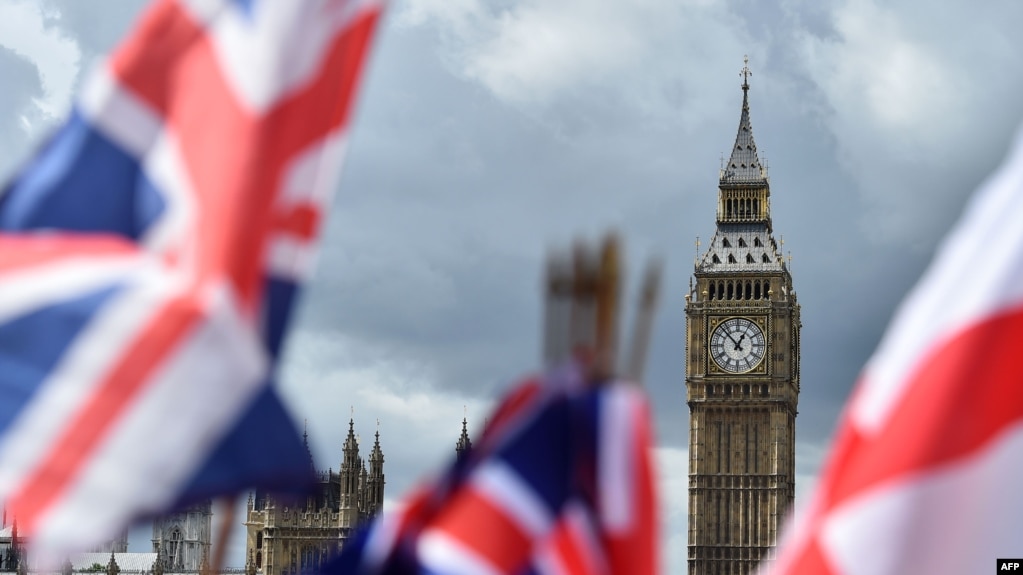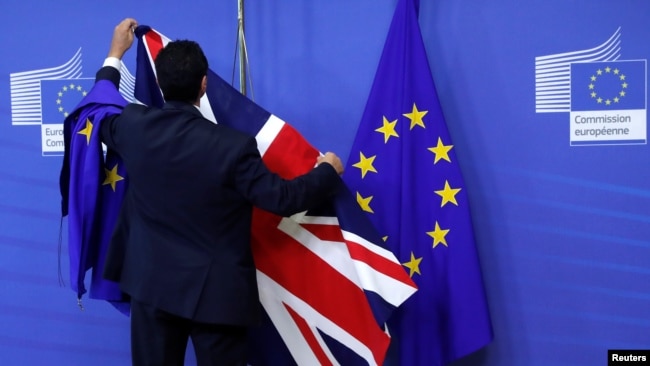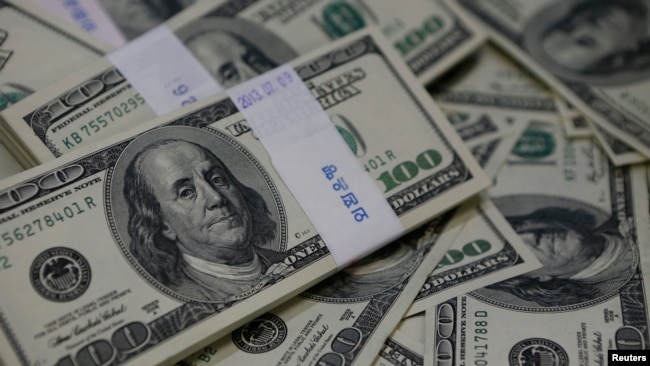Futures Forum: How the corrupt London property market has happened >>> Kleptocracy, a hobbled planning system and an obsession with house prices
And Brexit is not going to help matters.
As the Express reports:
Paradise Papers: Offshore tax crackdown could HAMPER Brexit | UK | News | Express.co.uk
As does the Gurdian:
The Brexiters who put their money offshore | News | The Guardian
This is from the Voice of America:
November 10, 2017
Henry Ridgwell

FILE - National flags flutter near the The Elizabeth Tower, commonly referred to as Big Ben, in central London, June 9, 2017.
LONDON —
From Britain’s Queen Elizabeth to Formula One racing champion Lewis Hamilton — the leak of more than 14 million documents from firms involved in offshore finance, known as the Paradise Papers, has engulfed some of the world’s most famous names.
The latest revelations show U2 frontman Bono used a company based in low-tax Malta to invest in a shopping mall in Lithuania. The Irish band, well known for its campaigning against poverty, has faced past criticism for its tax arrangements. There’s no suggestion that Bono acted illegally.
But campaigners against poverty say sheltering profits in secretive tax havens is depriving the public.
“This is money that’s lost to healthcare, to education, vital public services,” says Murray Worthy of Global Witness.
Europe wants to blacklist jurisdictions that refuse to cooperate on tax transparency. After a meeting of finance ministers this week, French representative Bruno Le Maire said the threat must be credible.
"If states do not stick to their commitments we have to put sanctions on those states,” he said Thursday.
Many of the world’s wealthy shelter their money in British Overseas Territories and Crown Dependencies, which operate autonomously and have their own rules on tax and company law. British Prime Minister Theresa May said the government is demanding more openness. “We want people to pay the tax that is due,” she told business leaders this week.
Campaigners question that commitment, especially as economic uncertainty grows after Britain’s vote to leave the European Union.

LONDON —
From Britain’s Queen Elizabeth to Formula One racing champion Lewis Hamilton — the leak of more than 14 million documents from firms involved in offshore finance, known as the Paradise Papers, has engulfed some of the world’s most famous names.
The latest revelations show U2 frontman Bono used a company based in low-tax Malta to invest in a shopping mall in Lithuania. The Irish band, well known for its campaigning against poverty, has faced past criticism for its tax arrangements. There’s no suggestion that Bono acted illegally.
But campaigners against poverty say sheltering profits in secretive tax havens is depriving the public.
“This is money that’s lost to healthcare, to education, vital public services,” says Murray Worthy of Global Witness.
Europe wants to blacklist jurisdictions that refuse to cooperate on tax transparency. After a meeting of finance ministers this week, French representative Bruno Le Maire said the threat must be credible.
"If states do not stick to their commitments we have to put sanctions on those states,” he said Thursday.
Many of the world’s wealthy shelter their money in British Overseas Territories and Crown Dependencies, which operate autonomously and have their own rules on tax and company law. British Prime Minister Theresa May said the government is demanding more openness. “We want people to pay the tax that is due,” she told business leaders this week.
Campaigners question that commitment, especially as economic uncertainty grows after Britain’s vote to leave the European Union.

FILE - Flags are arranged at the EU Commission headquarters ahead of a first full round of talks on Brexit, Britain's divorce terms from the European Union, in Brussels, Belgium, July 17, 2017.
“Since the Brexit vote here in the United Kingdom, the government has been far less assertive with British Overseas Territories and Crown Dependencies,” said Duncan Hames of Transparency International.
The group has just released the details of an investigation into how lax rules and enforcement on company ownership in Britain are exploited to launder illicit wealth. Hames says just six people are employed to police the ownership of the country’s 4 million registered companies.
“We looked at just over 50 known corruption and money-laundering schemes. And we found over 750 U.K. companies at the very heart of those schemes, which themselves amounted to some $80 billion.”

Forty-four of the companies identified in the investigation were officially registered at one mailbox — number 11, at 43 Bedford Street in central London.
The property is owned by a franchise of the firm Mail Boxes Etc. No allegations of corruption or money laundering are made against the owners — who told VOA they carry out due diligence and follow all U.K. laws. But mailbox forwarding services are a major weakness in the system, argues Hames.
“That has resulted in what we call ‘company factories’ — single locations where there are thousands upon thousands of companies registered. Not locations where there is any meaningful head office activity taking place. Half of the companies we found involved in these corruption and money-laundering schemes were registered at just eight addresses,” said Hames.
An estimated $100 billion of illicit wealth passes through London every year. Campaigners say British laws on company ownership urgently need tightening up.
Critics: Britain Dragging Its Feet on Tax Haven Clampdown as Brexit Looms - Voice of America
As pointed out by the EDW blog earlier this week:
UK politics and corruption – it’s not (only) “Johnny Foreigner” to blame | East Devon Watch
From a piece earlier this year:
It's time to talk about Britain - New thinking for the British economy - openDemocracy
And from an investigative journalist at last year's Hay-on-Wye festival:
UK is most corrupt country in the world, says mafia expert Roberto Saviano | The Independent
.
.
.
“Since the Brexit vote here in the United Kingdom, the government has been far less assertive with British Overseas Territories and Crown Dependencies,” said Duncan Hames of Transparency International.
The group has just released the details of an investigation into how lax rules and enforcement on company ownership in Britain are exploited to launder illicit wealth. Hames says just six people are employed to police the ownership of the country’s 4 million registered companies.
“We looked at just over 50 known corruption and money-laundering schemes. And we found over 750 U.K. companies at the very heart of those schemes, which themselves amounted to some $80 billion.”

Forty-four of the companies identified in the investigation were officially registered at one mailbox — number 11, at 43 Bedford Street in central London.
The property is owned by a franchise of the firm Mail Boxes Etc. No allegations of corruption or money laundering are made against the owners — who told VOA they carry out due diligence and follow all U.K. laws. But mailbox forwarding services are a major weakness in the system, argues Hames.
“That has resulted in what we call ‘company factories’ — single locations where there are thousands upon thousands of companies registered. Not locations where there is any meaningful head office activity taking place. Half of the companies we found involved in these corruption and money-laundering schemes were registered at just eight addresses,” said Hames.
An estimated $100 billion of illicit wealth passes through London every year. Campaigners say British laws on company ownership urgently need tightening up.
Critics: Britain Dragging Its Feet on Tax Haven Clampdown as Brexit Looms - Voice of America
As pointed out by the EDW blog earlier this week:
UK politics and corruption – it’s not (only) “Johnny Foreigner” to blame | East Devon Watch
From a piece earlier this year:
It's time to talk about Britain - New thinking for the British economy - openDemocracy
And from an investigative journalist at last year's Hay-on-Wye festival:
UK is most corrupt country in the world, says mafia expert Roberto Saviano | The Independent
.
.
.

No comments:
Post a Comment